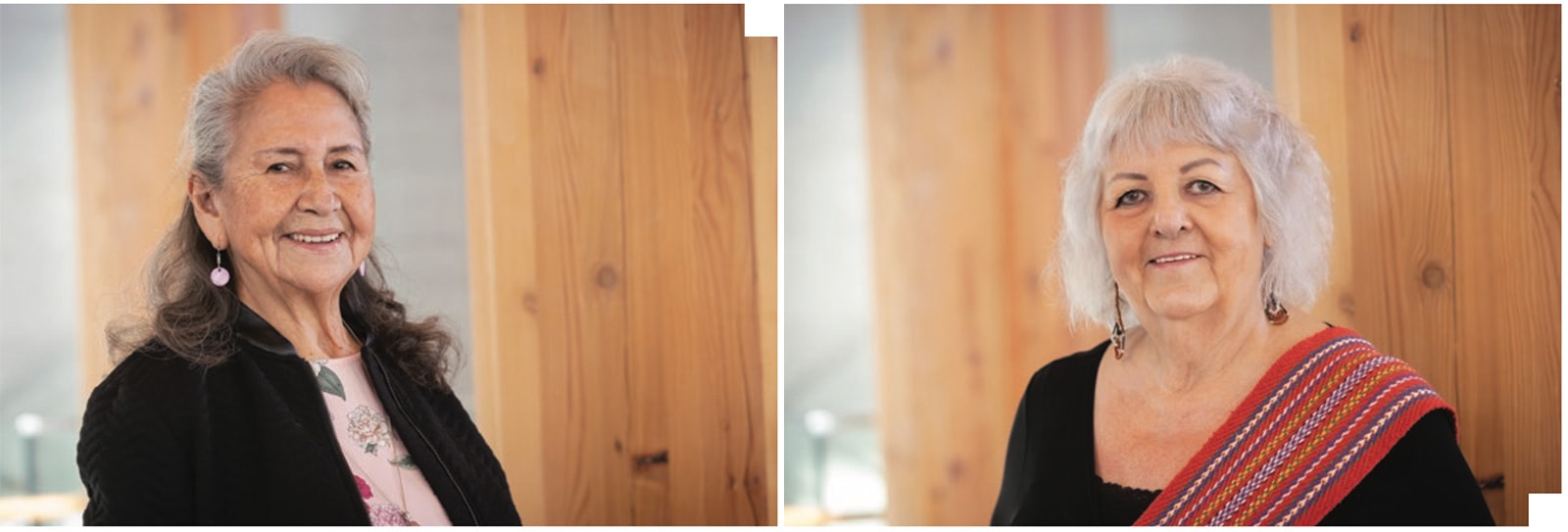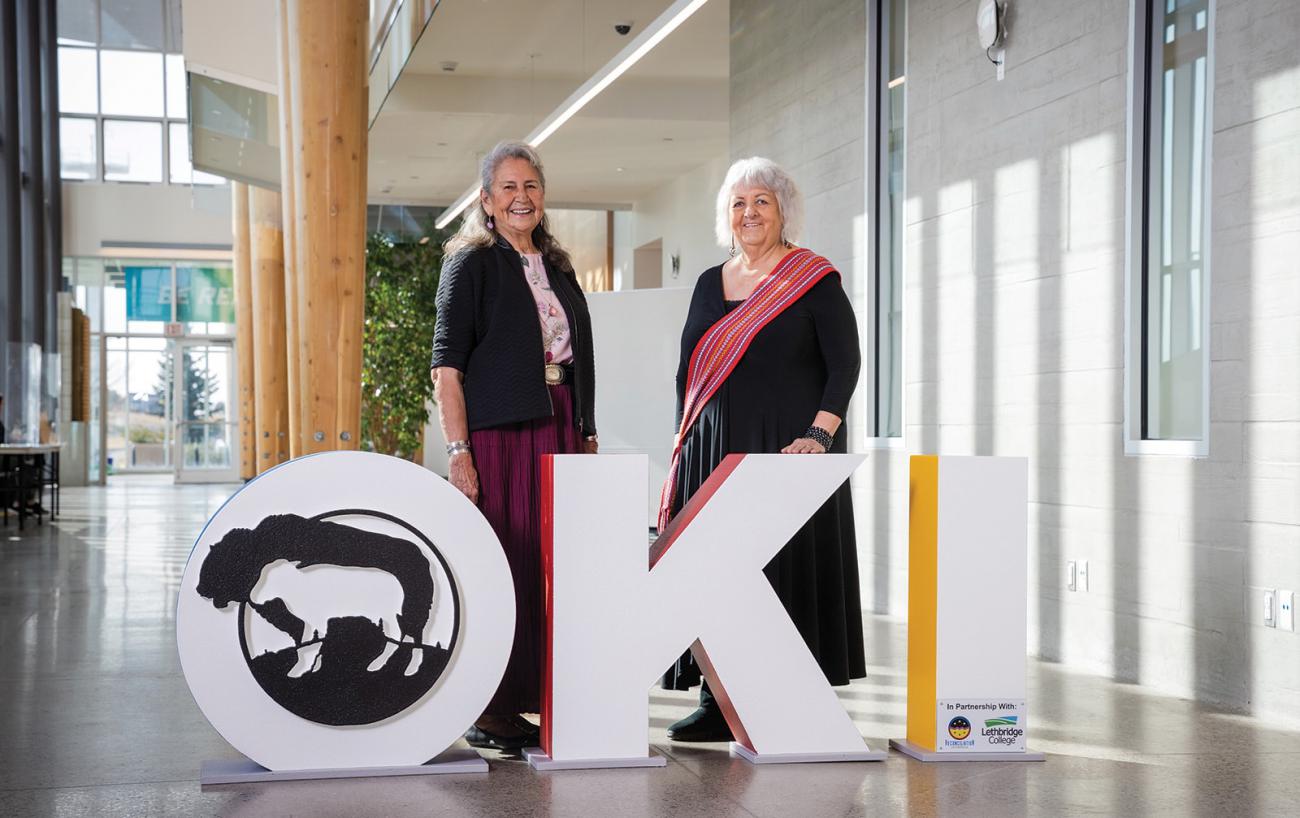As she sits down for this interview, Louise Saloff is beaming. She has just received a one-of-a-kind gift from a cherished friend. In a bag to her left sit two colourful ribbon skirts – traditional dresses often worn for Blackfoot ceremonies or celebrations, including powwows. The skirts are a gift from Betty Ann Little Wolf, a member of the Piikani Nation and one of Lethbridge College’s Kaahsinnooniks (Grandparents).
“I remember saying, when was it, a couple of years ago?” Louise asks Betty Ann, who is seated to her right, “that I was going to dance at a powwow when I was feeling better. Well, my health is restored and better, so she gifted me with two ribbon skirts.”
Betty Ann adds, “So she can dance.”
“So I can dance,” echoes Louise, smiling. “I’m ready. Now we just have to wait for COVID to go away so we can have a powwow.”
The laughter of the two women fills the college’s Niitsitapi Gathering Place. The interaction offers a glimpse of the meaningful relationship between the two of them, and the caring and generous spirit they add to the Lethbridge College community.
Louise is the college’s Métis Elder, and Betty Ann is the college’s Blackfoot Grandmother. The two of them are part of the college’s Indigenous Service’s Cultural Support Program. Each of them is available to meet with students, employees and community members to pass along traditional knowledge and provide guidance and support.
Betty Ann relates a person’s life to the four main support poles of a teepee – each represents a phase of a person’s life, and together they create a circle, with each part playing an important role in the overall structure. She says she is now in the fourth stage of her life where she is a Spiritual Elder in Blackfoot society. It is this point of view she brings to her work with the college.
In being blessed in reaching the fourth stage of my life, we receive the honour of expressing our opinions to support our young people,” explains Betty Ann. “I’m not saying that to be smart or anything, but I’ve learned through my hard times in boarding school and going through the circle and I survived.
And there was a reason as to why I survived, so that I could turn around and help the younger people.”
Betty Ann and Louise have different backgrounds and life experiences, and each brings a unique perspective to her role.
Born and raised in the Piikani Nation, Betty Ann was taken to a residential school when she was six years old. After 10 years in the residential school system, she tried to join the public school system in Pincher Creek for Grade 9, but an evaluation revealed her education was only equivalent to Grade 3. “We didn’t get taught academics,” she remembers of her time in residential school. “We were taught how to clean. We were taught how to be slaves. So, my dad took me out of that school because I ran away.”
Betty Ann and Louise have different backgrounds and life experiences, and each brings a unique perspective to her role.

While Betty Ann returned home, Louise found herself in a completely new environment. “I always felt like a fish out of water when I was walking down the halls of the university,” she remembers. She has vivid memories of sitting through an entirely wrong class because she was lost and too shy to get up and leave when she realized her mistake, and of crying in her backpack over a statistics class she was sure she would never pass.
However, slowly but surely, she found her confidence and her voice. “One of my friends came along, and she found out that she had to take that stats class too, and I think she wanted to stick her head in my backpack with me,” she laughs. “But we didn’t, and we became study buddies.” Another key turning point was a Native American Studies class, taught by acclaimed professor Dr. Leroy Little Bear. His teachings changed Louise’s life and gave her a new direction, “I think that piqued my interest to discover who I am.” She has gone on to explore her family’s history and as a proud Métis woman, she now also knows her family has Crow, Cree and Sioux heritage.
The paths of these two women crossed when they became part of the Lethbridge College community a few years ago. They use the cumulative knowledge gained over their lives to provide guidance and support, or just to lend an ear.
Remembering her own time as a student, Louise believes it would have been extremely valuable to have services and people to talk to available as a resource, so she tries to be that person for the students she meets. “If you can have that one person that you can reach out to,” she explains, “that’s what we’re here for. We’re here to help you. We will never judge you.”
The relationships the Grandparents forge with students are personal, and they mean just as much to the Grandparents as they do to the students. Even during the COVID-19 pandemic, they remain connected to students, using technologies like Zoom video conferencing to maintain those relationships. For Betty Ann, her work is an extension of not only her role as a Spiritual Elder in the Blackfoot community, but also of her years at F.P. Walshe. Many former students from that school are now studying at the college, where they are thrilled to see a familiar face.
“At the high school, they used to call me grandma,” explains Betty Ann. “And now, many times they say to me, ‘just seeing you in school, I feel OK, because my grandma’s here.’”
“If you can have that one person that you can reach out to,” she explains, “that’s what we’re here for. We’re here to help you. We will never judge you.”
A NOTE ABOUT NAMES
Regular readers of Wider Horizons may have noticed Louise Saloff and Betty Ann Little Wolf are referred to by their first names throughout this story, instead of by their last names, which is the typical Wider Horizons style for news and feature stories. This is by design. Shanda Webber, Lethbridge College manager of Indigenous Services, explains: “With Louise and Betty Ann being Elders, and specifically Grandmothers, it feels right and respectful to refer to them by their first names. Their first names indicate the warmth and kindness they bring to our campus. “In our cultural teachings, we are taught about the sacredness of women; honouring them by their first name affirms their identity of who they are as human beings and highlights the importance of their role in ceremony, their cultural teachings, their wisdom, their strength and resiliency and overall, respecting them as life-givers, teachers, advocates, role models, spiritual protectors, grandmothers, mothers, daughters, sisters, aunties and pillars of the community. Referring to Betty Ann and Louise by their first names in this story helps us stay true and respectful to who they are.”



